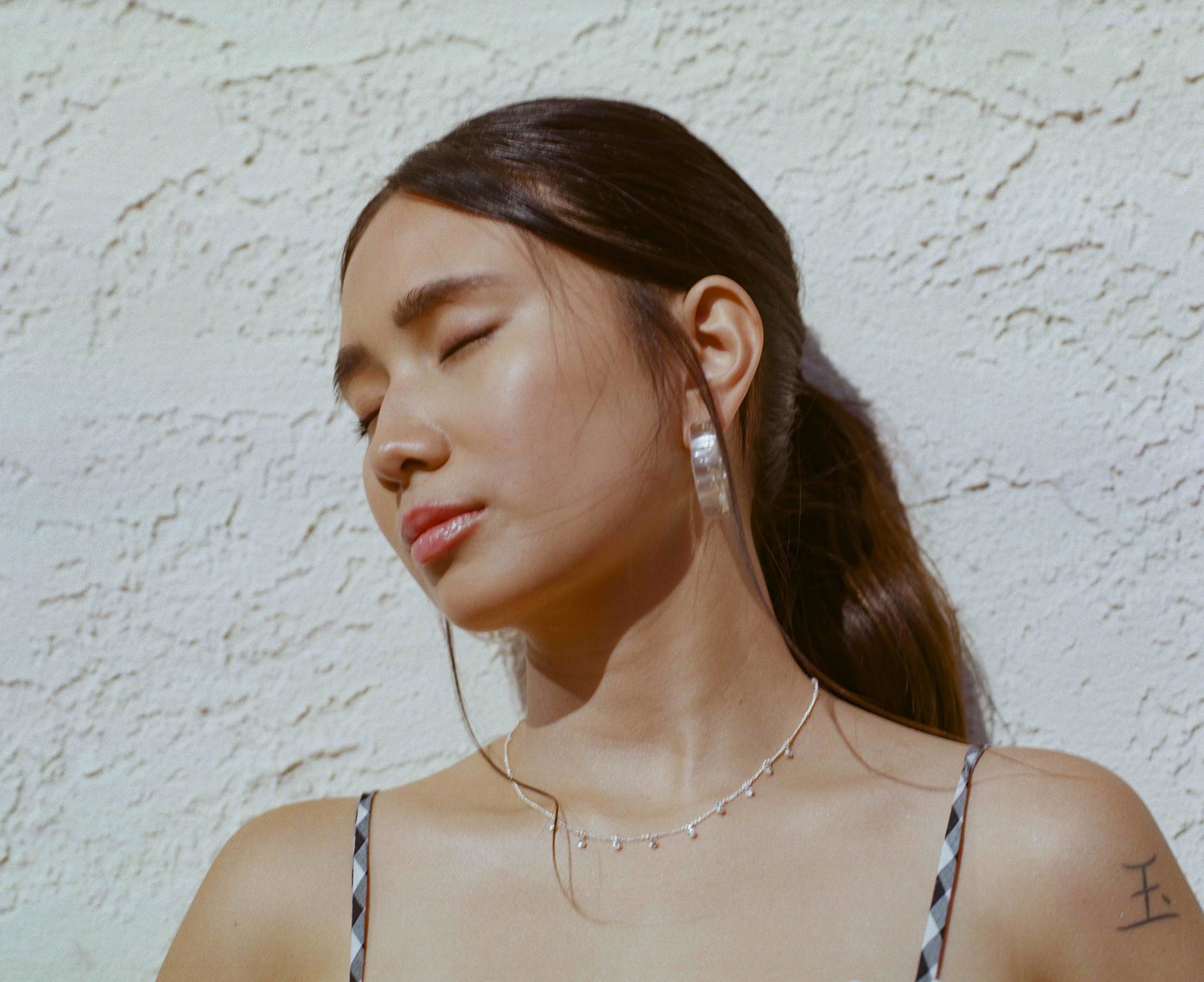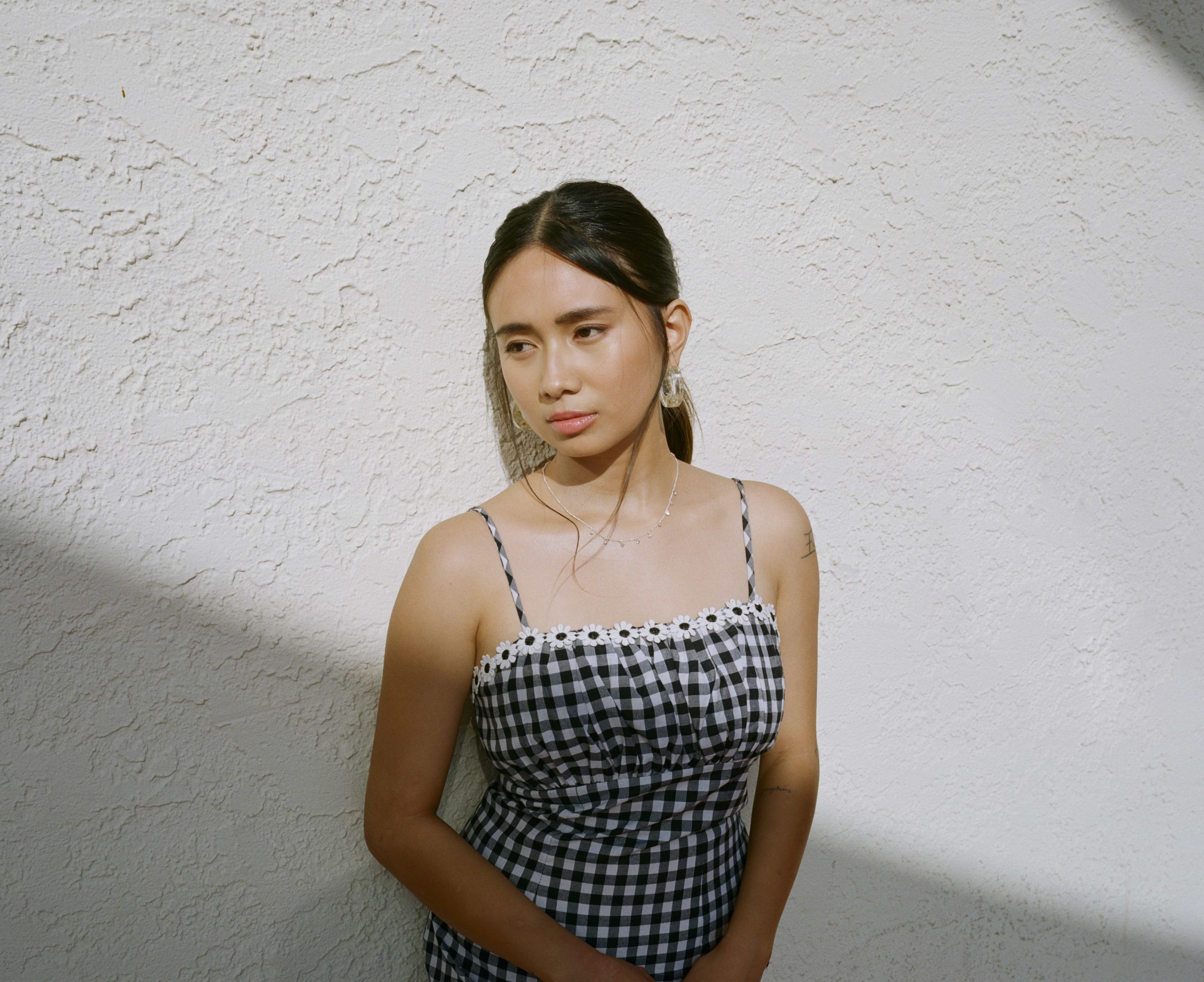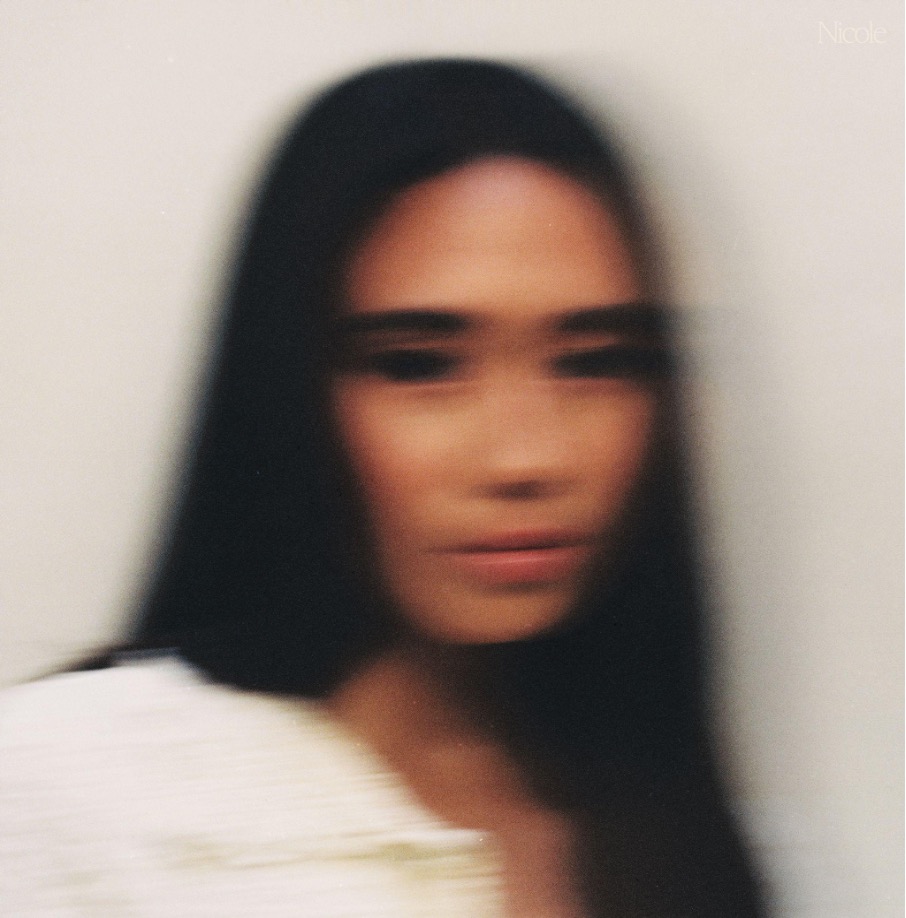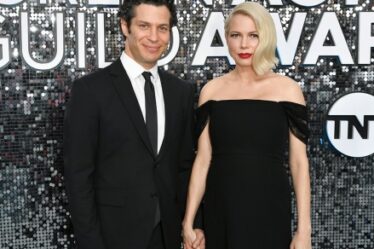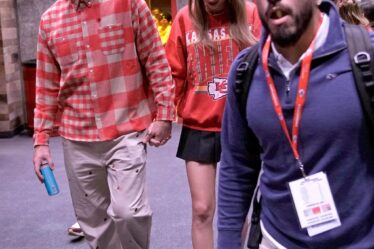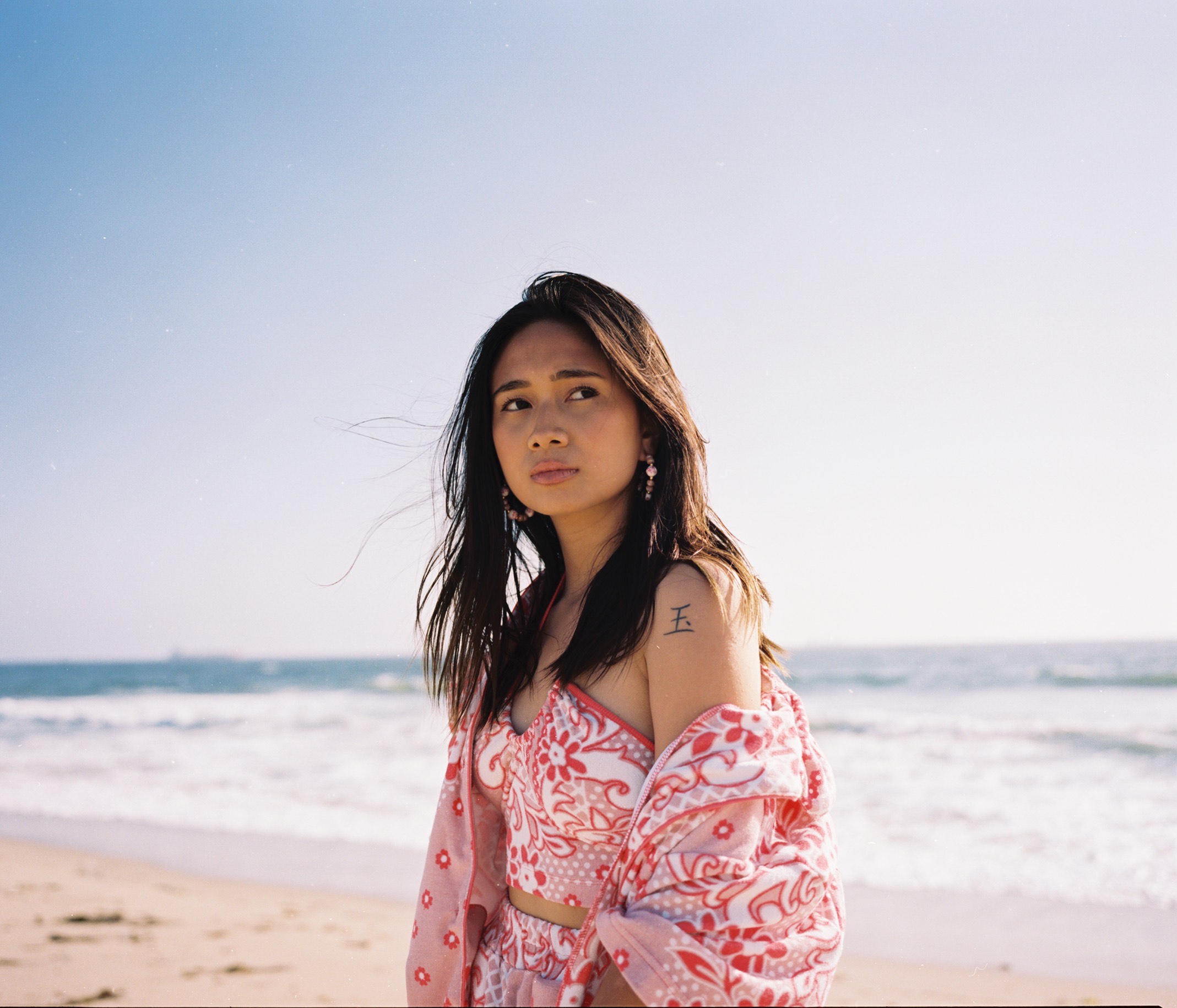
NIKI paces around her childhood bedroom. With her iPhone in hand, she records fleeting emotions into lyrical voice memos. Here, in a slouchy blue sweatshirt and loose bun, the singer is relaxed, letting her flow guide her. And while it’s a process that the artist has been doing since she first started music, it was also something sacred very few knew about. But, in this scene from her latest music video, “High School In Jakarta,” NIKI provides an intimate look into her artistry, bringing audiences to the bedroom where it all started.
“I love to be alone when I write,” the 23-year-old shares. “I grew up an only child and the way I started writing was just me in my bedroom with headphones and my guitar, so that’s my comfort zone.”
NIKI got her first guitar at the age of nine, and since then, has been translating her lived experience into euphonious songs. Recently, the singer has returned to these voice memos she created when she was in high school–attracted to her younger self’s vulnerability. One day after combing through her old song journals she decided to take a spontaneous trip to the studio. After having listened to Taylor Swift’s “All Too Well (10 Minute Version),” which dropped a few hours earlier, the artist realized she might be onto something. Inspired by the Grammy-award winning artist’s ability to pull from her own archive, NIKI began re-recording her own songs. And what was once a fun experiment, turned into a full-length album. Out today via 88rising, the new album is eponymously titled Nicole, a nod towards NIKI’s birth name, Nicole Zefanya. The sweeping 13-track project includes emotional ballads and charming odes to her teenage years–the good, the bad and the beautiful.
“I would love for this to act as a means to look back into your past and celebrate it,” she shares with V a week before the album dropped. From the 88rising studio in Los Angeles, she says, “There were definitely moments where I was like, ‘Oh my god, this is so cringy. Why did I write that when I was 15? I’ll never write that now.’ But I think it’s a lot more fun and less stressful to look back at your life fondly, because I believe every step and misstep that you make leads you to where you are today and I wouldn’t change anything.”
And NIKI is definitely onto something. There’s arguably no period of life more cringy and chaotic–yet, also strangely charming–than high school. For a period dictated by seemingly uncontrollable hormones and angst, it is definitely one of the most formative periods of our lives. Between infectious melodies and cozy guitar riffs, NIKI archives some of her most memorable teenage experiences: hanging out with her best friends, attending high school dances and of course, falling in love for the first time. And as she revisits her past experiences, almost a decade later, she looks back at them warmly.
The album combines NIKI’s affinity for suave songwriting and methodical production, telling tales of youthful romance with undeniable honesty and candor. It’s a big, beautiful project that reads very much like a confessional diary entry, overflowing with heartache and loss, but most of all, hope. The notion of the “unlived life” looms large on the album as well. Having grown up on Doctor Strange and multiverse novels, the singer finds herself crafting alternative realities on the project–perhaps, most seen on tracks like, “The Apartment We Won’t Share” and “Keeping Tabs.”
“I definitely find myself ruminating on the “What if’s” and that’s why I am such a sucker for multiversal concepts, like I love Everything Everywhere All at Once,” she says. “I find it very intriguing, all these little choices that we make in life compound and create this life path, but what about all the other paths? Because of the unlived life, you don’t have any answers. And I think writing about it is how I create closure and an answer for myself.”
Nicole is arguably NIKI’s piece-de-resistance that kicks off an exceptional new chapter for the burgeoning songstress. In a few weeks, NIKI will take her new collection of tracks for a spin in her very-first solo tour in North America. Starting off in Vancouver on September 8 and culminating in California on October 22, the tour will visit 23 cities. And in a few days (Aug. 18), the singer is set to drop a short film, “But I’m Letting Go,” on Amazon Prime Video. To accomplish her first foray into longer form storytelling, the musician teamed up with her “favorite collaborator,” Isaac Ravishankara. And in between the scenes at theater rehearsal and hanging out at the beach, you’ll find yourself unraveling a heart-wrenching love story that’s eerily familiar. With that visual and the rest of the album, NIKI opens up a whole new way to look back at our past–not anguish, but fondness, arguing we would not be the people we are today without it.
Ahead of her album release, we chatted with NIKI about her creative process, growing up in Jakarta and filming a music video with some of her closest friends.
V MAGAZINE: Excited to share insight into into your latest album, Nicole. Where did you start with this project?
NIKI: It loosely started in October of 2021–so it’s been pretty recent, honestly. What’s funny about it is I had no intention of making an album, I just asked for a day at the studio and I didn’t tell anybody what it was for. And that was when “All Too Well,” the 10 minute version just dropped and I was super inspired by it, and I went through my old catalog and I was like, “I would love a day where I can re-record this.” So I brought my acoustic guitar and sat in front of the mic and did one take of each song from when I was like 15, 16. Then when I went home that day with all of those one tape demos, I was like, “Maybe we have something here.” It organically evolved from there, and here we are today.
V: That’s so cool. So what’s it like in the studio with you? Do you like to be alone? Do you like to be surrounded by people?
N: This is a great question, this is an underrated question. Yeah, I love to be alone. I think I work the best that way and I think the most clearly that way. I grew up an only child and the way I started writing was just me in my bedroom with headphones and my guitar, so that’s my comfort zone. That’s the most comfortable for me, when it’s just me.
V: I feel that. And speaking of–this album goes to your roots and how you fell in love with music, can you take us back to the one specific moment where you first fell in love with music?
N: I would say when I first got my guitar, I must have been nine or ten. I remember really falling in love with music and writing. At that point I must have been in fourth or fifth grade. I always grew up around music. Everyone around me were musicians–my mother sang at church and all of my aunties and uncles were all musicians. So I grew up around it and was very familiar with it. I never enjoyed it truly as an art form until I got my guitar and I really felt like I had a sense of agency over myself. I don’t think I thought that when I was ten, but in retrospect, that’s sort of how it felt. I was just like, “Well, I get to be creative and this feels really good.” So yeah, I’d say when I first got my guitar. Short answer.”
V: Yeah, that makes sense. And what happened after that?
N: I was always a little kid at church that would get dragged on stage because it was a really small church and everybody knew everybody and I was always the youngest of all the kids at that church specifically. So I started singing at a really young age. But I would say at school, I went to a Christian private school and we had chapel every Tuesday, and I would lead the chapel band. I was the frontman of chapel band. I would lead worship, it’s really funny. But I think that was my first taste of performing in front of an audience. I would say that was my first exposure. Then there were recitals and Battle the Bands, but mostly school stuff. And the biggest thing that I did would be opening for Taylor when I was 15, and that was like, “holy shit.”
V: I love that. And you grew up in Jakarta, right? How do you think the city and also the country influenced your sound?
N: Definitely. Jakarta, and Indonesia, generally, I think is quite a musical country. Almost everyone I know from back home has some form of appreciation for music and singing. There’s a lot of singing growing up and I think that was the first sort seed planted, just a love for singing and using my voice in that way. Generally speaking, it was the national appreciation for music that solidified my love for it. Also my mom specifically, was in my inner circle. That was the person that I definitely sought a lot of inspiration from musically as well. She was a singer. We listened to a lot of R&B growing up and a lot of Western records, so she would play Whitney Houston and Boyz II Men and all that stuff. I was listening to that when I was really young. I think Indonesians love easy listening music, that’s what they generally gravitate to. The silky smooth, Jazzy chords. That’s why there’s a big love for R&B.
V: Nice, now to circle back to your album, as it’s titled Nicole, why did you want to label this body of work, Nicole? You’ve created so many songs, so many albums so why was this the one that you titled your own name?
N: Because it’s sort of the meeting point between high school me and current me because half of the record was written in high school, and this is me, present day, revisiting that version of myself and that part of my story and my life, so it just felt fitting. It’s sort of a nod to me before I was NIKI, and I was just known as Nicole, and that’s my given name. I’ve always loved that name. But everybody started calling me NIKI growing up and it just felt like it made sense. Moonchild was very avant-garde and conceptual, and this is just me, in the most pure form, authentic kind of way.
V: And do you know why your parents named you Nicole, is there a specific reasoning?
N: This is a cool story, I was actually so close to being named Olivia and apparently my aunt gave my dad a talking to about that and was just like, “I don’t know if I like it.” It’s really cute, I think my dad really revered his older sister. It’s really sweet. But she was like, “I don’t know, I feel like you could find a better name.” No shade to Olivia because I love that name, by the way. But she said that and he was like, “Okay.” I think they like Nicole because they said it sounded strong. And then later, I looked it up and apparently it means the victory of the people. Very dramatic and theatrical, which I think is fitting.
V: I feel like names are so crazy. They’re like self fulfilling prophecies. Maybe not at that moment, but slowly you grow into it, which is so crazy.
N: You’re so right. I was reading a book about that. It’s Emotional Inheritance by Galit Atlas. She was talking about that. It’s really, really interesting.
V: Yeah, very strange. And as you were talking about how it’s a remastered version of your old work, when you were looking back in your personal archive, do you think that there were certain ways that you’ve changed since then: sonically, aesthetically, personally? Or do you think your essence has remained the same?
N: Absolutely. I think it’s both. Definitely so much change has occurred since then. One, I know how to produce now. It wasn’t just me working out of GarageBand after school, not really knowing what I’m doing. Production wise, I definitely know how to produce now. And I know what I like sonically. This album, I feel like it’s seriously helped me solidify my sound as a producer because I touched every single song before I sent it off to my collaborators, my co-producers. I would produce a skeleton base of what I hear the song sounding like, and I did that for every single song. A lot of the original stems, sounds and pieces that I used are still in the song. I think now, truly through this album, I feel like I’m a producer. I had so much fun experimenting with sonics. All that to say, absolutely. There’s a lot of change, musically. But thematically, I don’t know. I think thematically, I still gravitate toward the same kind of lyrical content or themes surrounding love, or the unlived life.
V: Yeah for sure. Can you elaborate on this concept of the unlived life?
N: Yeah. I don’t want to say I live up here but I definitely find myself ruminating on the “What if’s” and that’s why I am such a sucker for multiversal concepts, like I love Everything Everywhere All at Once. There’s this book called The Midnight Library and then the latest Doctor Strange. I find it very intriguing, all these little choices that we make in life compound and create this life path but what about all the other paths? I think musically and lyrically that’s just such a fun thing to ponder about, especially when you’re thinking retrospectively about things that have happened. That’s a theme, that I create an answer for myself. Because of the unlived life, you don’t have any answers. And I think writing about it is how I create closure and an answer for myself.
V: That’s beautiful, I love that. You’re also about to release “High School In Jakarta” tomorrow. What are the emotions going through you right now?
N: I am so excited for this one. It’s so fun and I love when songs feel like what they’re talking about. I love when it’s cohesive in every way and I think “High School In Jakarta” is a really good example of that kind of song. It just feels so nostalgic and young. But also with a wisdom that I probably didn’t have back then, because I wrote this one retrospectively, recently. It’s definitely one of my favorites, and it’s really interesting because it took the longest to be done. Everything was written but production wise, it was one of the longer ones to be finished and I’m just so happy with where it is today.
V: I think it sounds a lot like a diary entry, but retrospective, like you’re writing about an experience that happened in the past. I also want to talk about art because I saw on your Instagram that you have friends and your fellow 88rising members sitting for a class portrait, which I thought was so cute. What was the creative vision behind that?
N: Yeah, so the music video is coming out in a few hours. For that music video I had from the jump, as soon as I wrote that song, I told all my best friends that I went to high school with that also live in the States that I’d love for them to be in it. So I called my core friend group of four, it’s the four of us. I called my three girlfriends and I was like, “You guys need to carve out some time in March to come out to LA to be in this video because I can’t do it without you.” And then as soon as they were on board with it. I was like “Oh, but what about if Brian was in it, and Warren, wouldn’t it be so fun if there are little easter eggs?” And so I hit them up too. I was like, “You guys want to be in it? and they’re like, “Yeah!” We dedicated a whole day shooting those high school vignettes or scenes and it was so much fun. There was a little yearbook photo shoot setup, and then we took photos. Then I knew immediately when we did that setup that we must do a yearbook with superlatives to post on Instagram because it’s just too good.
V: Yeah, I love Natasha’s where it was like, “Most Likely to End Up on Love Island.” That was like my favorite one.
N: Yeah, we were coming up with the superlatives together as well. It’s a lot of inside stuff and very true to character.
V: What was filming like? What was the vibe on set?
N: Yeah, so these music videos are a three part series, it exists as a short film. The short film is going to come out following the album release. But in the music video versions, there’ll be a scene and you don’t really hear what we’re saying. In the short film, you will hear all of that dialogue and there’s this singular narrative and everything will be tied together. And I love when that happens. So we shot that in five days at the beginning of May and it was a whirlwind shoot. We shot all the “High School In Jakarta” stuff the first day so all of my friends came out for that day. It was such a ball. And yes, I worked on the story. The story is loosely about me and my life in high school. I worked on it with director Isaac Ravishankara, who’s just been a beast of a collaborator, probably my favorite collaborator that I’ve worked with visually thus far. It’s incredible. It’s been such a family affair in many ways. This project, what I love about it is that it feels very DIY. I was telling you earlier, you asked me if I like to be alone in the studio. A lot of this record was done in the living rooms of producers. Most of it was recorded in Jacob’s living room. I did three songs in Ethan Gruska’s garage. There’s just something really charmed about it that I love. The process was so fun.
V: It’s an intimate vibe.
N: Yeah, intimate, DIY. And all of my friends were involved in some way. My best friends are also peppered throughout the record. At the end of “Facebook Friends,” the screaming you hear at the end, that’s just all inside jokes between me and my girlfriends. I tried to put their voices in, in some way.
V: I also wanted to ask you for the music videos. Where did you film it?
N: Somewhere in Pacific Palisades, I think in Los Angeles. It was a really cool school. We actually shot at a high school and we had to do it over the weekend, obviously, because there wouldn’t be any kids. It felt so strange, getting dressed and being put back into a uniform and going to all these classrooms. It felt so real and weird that we were really reliving those days. It also didn’t help that my actual high school friends that I grew up with, were also there [laughs]. It really was a blast into the past and it was really fun.
V: I’m excited to see it in a few hours. With this whole album that you’ve created, is there something that you want to say? A specific message or some themes that you hope will resonate with people?
N: Yeah, I would love for this to act as a means to look back into your past and celebrate it. As I was writing this, obviously we were looking through all of my old songs. There were definitely moments where I was like, “Oh my god, this is so cringy. Why did I write that when I was 15? I’ll never write that now.” But I think it’s a lot more fun and less stressful to look back at your life fondly, because I believe every step and misstep that you make leads you to where you are today and I wouldn’t change anything. I would love for my fans to feel all the feels and feel all the nostalgia, but also just look back and celebrate who they were and have been to themselves. It’s also a fun little celebration of the past with all of my fans that have actually been there from the jump, during the YouTube days. It’s so cool because I still follow some of them on Instagram, back when I was a private account. It feels like we grew up together somehow and to see them retweet this project now or repost it. They’re like, “Oh, my God, I listened to it at 16, going through a breakup.” It’s awesome.
V: That’s crazy. It’s definitely a feel good message. And the last question I have for you is, as a whole, how do you think 88rising has helped you develop your voice as an artist?
N: I am extremely, extremely blessed and lucky to be at 88rising where I have complete creative freedom to pave my own way. With my own artistry, from the jump, it was always like, “How can we support you?” I always felt like I had control and not a lot of artists get to say that. I think 88 has done a good job of guiding me through all of it and holding my hand through all of it, but also at the same time, let me know that I’m in the driver’s seat. I’ve been lucky to have been in a position where, throughout the past five years, I was able to find my voice as an artist and my sound, whatever that means, because that always changes every year. I’ve never felt boxed in at 88 and I really feel that applies for all the other artists. It really does feel like a family and we’ve gone through a lot together and grown together. I think it’s a really beautiful thing.


